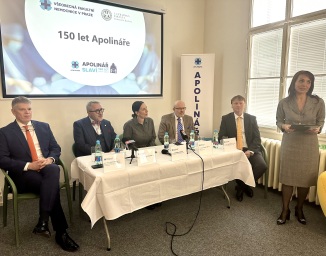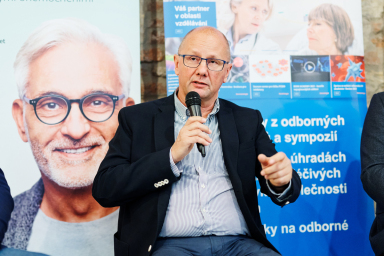Public health covers a wide range of activities and areas, which aim to ensure that the entire population lives as long as possible in good health. The implementation of the measures requires the involvement of all ministries, from health to industry, which should ensure quality food. But the problem is that we do not have sufficient experts in the Czech Republic to implement the programmes and put them into practice. Unfortunately, it is also a sad fact that public healthcare and prevention remains marginalized, as the results are only visible in the longer term – and thus hard to score political points with. Barbora Macková, director of the National Institute of Public Health, discussed the issue at the 2nd Annual International Panel of the Permanent Conference on Healthcare, which took place on 6 September in Prague.
„It is important to stress the difference between clinical medicine and public health. While clinical medicine is focused on the health of the individual, public health is primarily focused on the health of the population. Measures and procedures leading to health do not only depend on the health sector, but on all ministries and the environment in which we live,“ says Barbora Macková, adding that public health aims to prolong healthy life and prevent illnesses and injuries.
Public health questions are usually based on clinical medicine, where we ask whether a patient’s condition could have been prevented and how. The environment in which a person lives and works, their lifestyle or how they approach their health can play a role. Therefore, research looks at the determinants of health (environmental or socio-economic), lifestyle, the impact of addictions, nutrition or exercise, disease prevention in the form of vaccinations, preventive check-ups and health literacy. The data can then be used to create public health policies.

„Primary prevention is not just a matter of one ministry, but of the society as a whole. Attitudes, motivations, mindsets, and values are important. Up to 80 percent of diseases, whether infectious or non-infectious, are preventable by a healthy lifestyle,“ emphasizes Macková. One example is healthy nutrition, which requires the involvement of the Ministry of Education, Agriculture and Industry alongside the Ministry of Health.
An underestimated component of healthcare policy
However, even the Director of the National Institute of Public Health admits that there is no immediate pay-off to investments in prevention, and are therefore not very attractive for many politicians because they do not result in instant political points. Many of the measures take effect after ten years, well beyond the normal lifetime of most politicians.
On the other hand, we must not forget the major economic losses caused by diseases and which can be prevented to some extent. According to the Czech Statistical Office, medical expenses themselves in the Czech Republic amounted to CZK 477.7 billion in 2019, but non-medical losses are two to three times higher, according to the World Health Organization. Three years ago, losses from diseases in the Czech Republic amounted to at least CZK 1.4 trillion.

Public health has three key areas. The first is prevention and preparedness, which seeks to prevent diseases (e.g. screening and vaccination) and monitoring a variety of factors from tobacco use to pollen season. The second component is protection in the form of controlling infectious diseases, managing environmental risks or ensuring a healthy working environment. Thirdly, it is about promoting and increasing health literacy, not at a very high level in our country.
„We need to be able to assess the situation ourselves on the basis of available, valid data, not only in the professional field, but also in the public sphere, and to make the right decisions not only about how to set up intervention programmes, campaigns or educational actions, but also about procedures in families or workplaces. However, I am concerned that public health and prevention are still an underestimated part of healthcare policy in the Czech Republic. It is important not only to strengthen capacities, but also to coordinate and strengthen activities leading to the acquisition of data needed for decision-making and follow-up in programmes,“ explains Barbora Macková.
Mohlo by vás zajímat
Lack of staff to help implement programmes
In addition, it is also important to promote public health as a science – i.e. to accept, for example, serological surveys in research as scientific projects generating data essential for public health.

According to Barbara Macková, public health is an umbrella that covers a wide range of activities from the medical side to research. But there aren’t enough of those to hold the umbrella, i.e. public health professionals, in the Czech Republic.
„We have no shortage of experts dedicated to data collection or the scientific aspect of the issue, but what we lack is the capacity and personnel to help implement and put the programmes into practice – not only in terms of teaching or motivation, but also in terms of execution so that the entire public health system is functional,“ Barbora Macková adds.
Michaela Koubová








